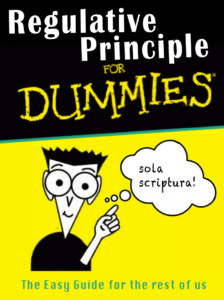 Unlike the author of this article, I am not a Presbyterean, nor am I a part of the PCA, but the principles outlined here by Steve Tipton concerning the Regulative Principle of Worship, I find helpful.
Unlike the author of this article, I am not a Presbyterean, nor am I a part of the PCA, but the principles outlined here by Steve Tipton concerning the Regulative Principle of Worship, I find helpful.
Article: The Regulative Principle of “Liturgical Sameness?” by Steve Tipton (original source here)
In the Presbyterian Church in America (PCA)–the denomination in which I serve as a minister of the Gospel–quite a number of ministers lament the fact that you can attend five of our churches (all within the same city) only to have five very different worship experiences. Additionally, these same ministers lament what seems to be an utter lack of any kind of corporate worship identity within the denomination as a whole. It is indisputable that there is a lack of uniformity in worship practices within the denomination. In light of that truth, the questions that we should be asking are: “Why is there such diversity regarding worship practices in the PCA?” and “Should we view this diversity as a negative thing?”
Some have suggested that the basis for such divergence in worship practices is due, at least in large part, to a lack of understanding of the Regulative Principle of Worship (RPW)–a principle that is found in Chapter 21 of the Westminster Confession of Faith. Others have suggested that it is due to the fact that the “Directory for the Worship of God” (a section of the PCA’s Book of Church Order) is mostly, non-binding upon the church. Still others have intimated that it is due to what they perceive to be a descent into the dark valley of the Judges, where everyone merely does what is right in their own eyes.
Whatever one may say, of this much we may agree: There is a lack of understanding of the RPW on the part of many who enter into this debate. The PCA’s “Directory for Worship” functions merely as an advisory document; and, apart from chapters 56-58, the Directory has no “force of law” in the PCA. Regardless of that fact, I want to make the following observations about the the greater issues that lie behind the widespread divergence in worship practices in the PCA:
First, I have observed an almost universal lack of understanding as to what the Regulative Principle of Worship actually is. Therefore, there is a lack of understanding of what the RPW is not. In the first paragraph of chapter 21 of the WCF, the Divines explain that however much worship is owed to God by mankind, He must only be worshiped according to the way he has instituted in his Word. God may not be worshipped according to “the imaginations and devices of men or the suggestions of Satan.” Worship, then, must be conformed to the instructions given in Scripture.
As we proceed through the various paragraphs in chapter 21, we discover the various activities (i.e. the “elements” of worship) that are given in the Word: Prayer, the reading of Scripture, the preaching (and conscionable hearing) of the Word, the singing of psalms, and the sacraments as ordinary parts of worship, along with oaths, vows, fasting and thanksgiving upon special occasions.
Interestingly the WCF says nothing about an order, or “liturgy,” for our worship services. It also says nothing about which instruments, if any, should be used to accompany the congregation in their singing. Therefore, it ought to strike us as awfully strange and “unconfessional” to argue that those churches that have a particular liturgy and uses traditional hymns accompanied by a piano are worshipping according to the RPW, whereas those churches that have an different liturgy and sing contemporary hymns accompanied by a guitar – even (dare I say it) an electric guitar – are not worshipping according to the RPW. To be sure, there is nothing in Scripture that gives us the positive warrant to use of a Les Paul plugged into a Marshall half stack turned up to eleven to assist the congregation in singing praise to God. But, to be fair, neither would the Apostle Paul know what a piano was if it ran him over as it rolled down the street. Yet either (at least theoretically) can be used to accompany congregational singing–provided they are circumstances of worship–since they do not run contrary to the RPW.
The RPW tells us what elements are to be present during worship, but the RPW does not tell us how those elements may be circumstantially accompanied and performed. Neither, frankly, does Scripture. There is great freedom to plan and arrange worship, then, within the framework of the RPW. To argue otherwise is to go beyond what the RPW was designed to teach. Therefore to go beyond the basic principles of the RPW is to go beyond Scripture.
Second, I wonder if any of those who refer to the “Directory for the Public Worship of God” in this debate have actually read it. This applies both to those who point to its “unconstitutional” status as well as to those who raise irate opposition when someone suggests that it should become constitutional in our denomination. It is actually quite benign. I read nothing in it by way “regulative principles” that I do not find in the WCF. What it does contain is a wealth of helpful advice-much of which is couched as pious advice-for worship. It prescribes no specific liturgy. It demands no particular forms. No doubt those who state differences with the Westminster Standards on issues related to the Sabbath would have similar concerns with Chapter 48 – yet even those who find the Standards too restrictive on issues of recreation would find much helpful advice in that particular chapter for every other aspect of Sabbath keeping.
I mention the “Directory of the Public Worship of God”, however, to remind those engaged in the worship wars that the Directory does not demand monolithic uniformity in our worship service. Neither the directory nor the confession give the kind of rule and guide that would create any kind of liturgical uniformity such that you would finally be able to attend five different PCA churches and not experience five different worship liturgies or five different expressions of congregational singing. As Derek Thomas has aptly explained in his 2010 Tabletalk article, “The Regulative Principle of Worship:”
[The RPW] “does not commit the church to a ‘cookie-cutter,’ liturgical sameness. Within an adherence to the principle there is enormous room for variation–in matters that Scripture has not specifically addressed (adiaphora). Thus, the regulative principle as such may not be invoked to determine whether contemporary or traditional songs are employed, whether three verses or three chapters of Scripture are read, whether one long prayer or several short prayers are made, or whether a single cup or individual cups with real wine or grape juice are utilized at the Lord’s Supper. To all of these issues, the principle “all things should be done decently and in order” (1 Cor. 14:40) must be applied.”
Third, given that the PRW and the Directory do not, in themselves, provide a set liturgy for the organization of worship (and, therefore, for organizational uniformity within the denomination), upon what basis are local churches to decide how to organize their worship? Clearly, they are to be guided by the elements as they are laid out in Scripture. Clearly, the RPW provides a grid though which to understand both what elements are to be included and what potential elements are to be precluded. And, clearly, the constitutional sections of the “Directory for Public Worship” gives specific guidance to their respective elements. But what else is there to which we are to adhere?
Continue reading →
 Jeff is a senior editor for The Gospel Coalition. A native of Blairsville, Ga., Jeff holds a bachelor’s degree in journalism from The University of Georgia, a Master of Divinity in biblical and theological studies and a Ph.D. in historical theology with an emphasis on Baptist history from The Southern Baptist Theological Seminary, Louisville, Kentucky. He is pastor of New City Church in Louisville, KY. Jeff and his wife Lisa have been married for 19 years and have four children.
Jeff is a senior editor for The Gospel Coalition. A native of Blairsville, Ga., Jeff holds a bachelor’s degree in journalism from The University of Georgia, a Master of Divinity in biblical and theological studies and a Ph.D. in historical theology with an emphasis on Baptist history from The Southern Baptist Theological Seminary, Louisville, Kentucky. He is pastor of New City Church in Louisville, KY. Jeff and his wife Lisa have been married for 19 years and have four children.
 Two articles that seek to apply the regulative principle of worship to the issue of movie clips (and other things):
Two articles that seek to apply the regulative principle of worship to the issue of movie clips (and other things): Unlike the author of this article, I am not a Presbyterean, nor am I a part of the PCA, but the principles outlined here by Steve Tipton concerning the Regulative Principle of Worship, I find helpful.
Unlike the author of this article, I am not a Presbyterean, nor am I a part of the PCA, but the principles outlined here by Steve Tipton concerning the Regulative Principle of Worship, I find helpful.